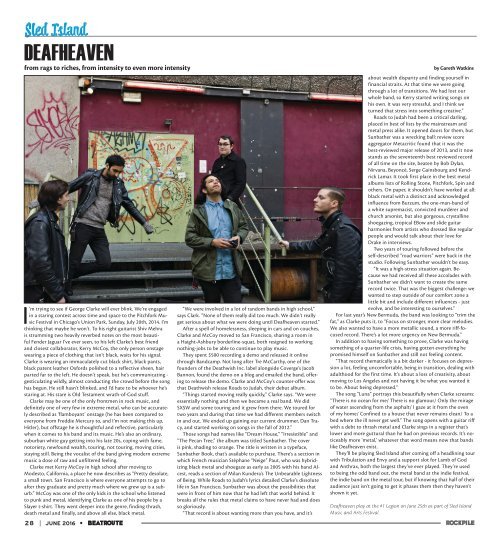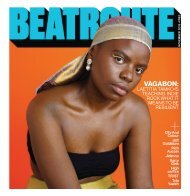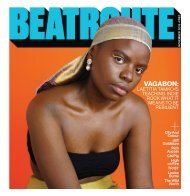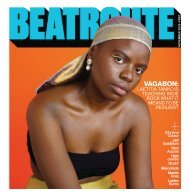BeatRoute Magazine Alberta print e-edtion - June 2016
BeatRoute Magazine is a monthly arts and entertainment paper based in Western Canada with a predominant focus on music – local, independent or otherwise.
BeatRoute Magazine is a monthly arts and entertainment paper based in Western Canada with a predominant focus on music – local, independent or otherwise.
You also want an ePaper? Increase the reach of your titles
YUMPU automatically turns print PDFs into web optimized ePapers that Google loves.
DEAFHEAVEN<br />
from rags to riches, from intensity to even more intensity<br />
I’m trying to see if George Clarke will ever blink. We’re engaged<br />
in a staring contest across time and space to the Pitchfork Music<br />
Festival in Chicago’s Union Park, Sunday, July 20th, 2014. I’m<br />
thinking that maybe he won’t. To his right guitarist Shiv Mehra<br />
is strumming two heavily reverbed notes on the most beautiful<br />
Fender Jaguar I’ve ever seen, to his left Clarke’s best friend<br />
and closest collaborator, Kerry McCoy, the only person onstage<br />
wearing a piece of clothing that isn’t black, waits for his signal.<br />
Clarke is wearing an immaculately cut black shirt, black pants,<br />
black patent leather Oxfords polished to a reflective sheen, hair<br />
parted far to the left. He doesn’t speak, but he’s communicating -<br />
gesticulating wildly, almost conducting the crowd before the song<br />
has begun. He still hasn’t blinked, and I’d hate to be whoever he’s<br />
staring at. His stare is Old Testament wrath-of-God stuff.<br />
Clarke may be one of the only frontmen in rock music, and<br />
definitely one of very few in extreme metal, who can be accurately<br />
described as ‘flamboyant’ onstage (he has been compared to<br />
everyone from Freddie Mercury to, and I’m not making this up,<br />
Hitler), but offstage he is thoughtful and reflective, particularly<br />
when it comes to his band and its music. He’s also an ordinary,<br />
suburban white guy getting into his late 20s, coping with fame,<br />
notoriety, newfound wealth, touring, not touring, moving cities,<br />
staying still. Being the vocalist of the band giving modern extreme<br />
music a dose of raw and unfiltered feeling.<br />
Clarke met Kerry McCoy in high school after moving to<br />
Modesto, California, a place he now describes as “Pretty desolate,<br />
a small town. San Francisco is where everyone attempts to go to<br />
after they graduate and pretty much where we grew up is a suburb.”<br />
McCoy was one of the only kids in the school who listened<br />
to punk and metal, identifying Clarke as one of his people by a<br />
Slayer t-shirt. They went deeper into the genre, finding thrash,<br />
death metal and finally, and above all else, black metal.<br />
“We were involved in a lot of random bands in high school,”<br />
says Clark. “None of them really did too much. We didn’t really<br />
get serious about what we were doing until Deafheaven started.”<br />
After a spell of homelessness, sleeping in cars and on couches,<br />
Clarke and McCoy moved to San Francisco, sharing a room in<br />
a Haight-Ashbury borderline-squat, both resigned to working<br />
nothing-jobs to be able to continue to play music.<br />
They spent $500 recording a demo and released it online<br />
through Bandcamp. Not long after Tre McCarthy, one of the<br />
founders of the Deathwish Inc. label alongside Coverge’s Jacob<br />
Bannon, found the demo on a blog and emailed the band, offering<br />
to release the demo. Clarke and McCoy’s counter-offer was<br />
that Deathwish release Roads to Judah, their debut album.<br />
“Things started moving really quickly,” Clarke says. “We were<br />
essentially nothing and then we became a real band. We did<br />
SXSW and some touring and it grew from there. We toured for<br />
two years and during that time we had different members switch<br />
in and out. We ended up gaining our current drummer, Dan Tracy,<br />
and started working on songs in the fall of 2012.”<br />
Those songs had names like “Dream House,” “Irresistible” and<br />
“The Pecan Tree,” the album was titled Sunbather. The cover<br />
is pink, shading to orange. The title is written in a typeface,<br />
Sunbather Book, that’s available to purchase. There’s a section in<br />
which French musician Stéphane “Neige” Paut, who was hybridizing<br />
black metal and shoegaze as early as 2005 with his band Alcest,<br />
reads a section of Milan Kundera’s The Unbearable Lightness<br />
of Being. While Roads to Judah’s lyrics detailed Clarke’s dissolute<br />
life in San Francisco, Sunbather was about the possibilities that<br />
were in front of him now that he had left that world behind. It<br />
breaks all the rules that metal claims to have never had and does<br />
so gloriously.<br />
“That record is about wanting more than you have, and it’s<br />
by Gareth Watkins<br />
about wealth disparity and finding yourself in<br />
financial straits. At that time we were going<br />
through a lot of transitions. We had lost our<br />
whole band, so Kerry started writing songs on<br />
his own. It was very stressful, and I think we<br />
turned that stress into something creative.”<br />
Roads to Judah had been a critical darling,<br />
placed in best of lists by the mainstream and<br />
metal press alike. It opened doors for them, but<br />
Sunbather was a wrecking ball: review score<br />
aggregator Metacritic found that it was the<br />
best-reviewed major release of 2013, and it now<br />
stands as the seventeenth best reviewed record<br />
of all time on the site, beaten by Bob Dylan,<br />
Nirvana, Beyoncé, Serge Gainsbourg and Kendrick<br />
Lamar. It took first place in the best metal<br />
albums lists of Rolling Stone, Pitchfork, Spin and<br />
others. On paper, it shouldn’t have worked at all:<br />
black metal with a distinct and acknowledged<br />
influence from Burzum, the one-man-band of<br />
a white supremacist, convicted murderer and<br />
church arsonist, but also gorgeous, crystalline<br />
shoegazing, tropical EBow and slide guitar<br />
harmonies from artists who dressed like regular<br />
people and would talk about their love for<br />
Drake in interviews.<br />
Two years of touring followed before the<br />
self-described “road warriors” were back in the<br />
studio. Following Sunbather wouldn’t be easy.<br />
“It was a high-stress situation again. Because<br />
we had received all these accolades with<br />
Sunbather we didn’t want to create the same<br />
record twice. That was the biggest challenge: we<br />
wanted to step outside of our comfort zone a<br />
little bit and include different influences - just<br />
evolve, and be interesting to ourselves.”<br />
For last year’s New Bermuda, the band was looking to “trim the<br />
fat,” as Clarke puts it, to “Focus on stronger, more clear melodies.<br />
We also wanted to have a more metallic sound, a more riff-focused<br />
record. There’s a lot more urgency on New Bermuda.”<br />
In addition to having something to prove, Clarke was having<br />
something of a quarter-life crisis, having gotten everything he<br />
promised himself on Sunbather and still not feeling content.<br />
“That record thematically is a bit darker - it focuses on depression<br />
a lot, feeling uncomfortable, being in transition, dealing with<br />
adulthood for the first time. It’s about a loss of creativity, about<br />
moving to Los Angeles and not having it be what you wanted it<br />
to be. About being depressed.”<br />
The song “Luna” portrays this beautifully when Clarke screams:<br />
“There is no ocean for me/ There is no glamour/ Only the mirage<br />
of water ascending from the asphalt/ I gaze at it from the oven<br />
of my home/ Confined to a house that never remains clean/ To a<br />
bed where the ill never get well.” The song opens with a guitar riff<br />
with a debt to thrash metal and Clarke sings in a register that’s<br />
lower and more guttural than he had on previous records. It’s noticeably<br />
more ‘metal,’ whatever that word means now that bands<br />
like Deafheaven exist.<br />
They’ll be playing Sled Island after coming off a headlining tour<br />
with Tribulation and Envy and a support slot for Lamb of God<br />
and Anthrax, both the largest they’ve ever played. They’re used<br />
to being the odd band out, the metal band at the indie festival,<br />
the indie band on the metal tour, but if knowing that half of their<br />
audience just isn’t going to get it phases them then they haven’t<br />
shown it yet.<br />
Deafheaven play at the #1 Legion on <strong>June</strong> 25th as part of Sled Island<br />
Music and Arts Festival.<br />
28 | JUNE <strong>2016</strong> • BEATROUTE ROCKPILE


















